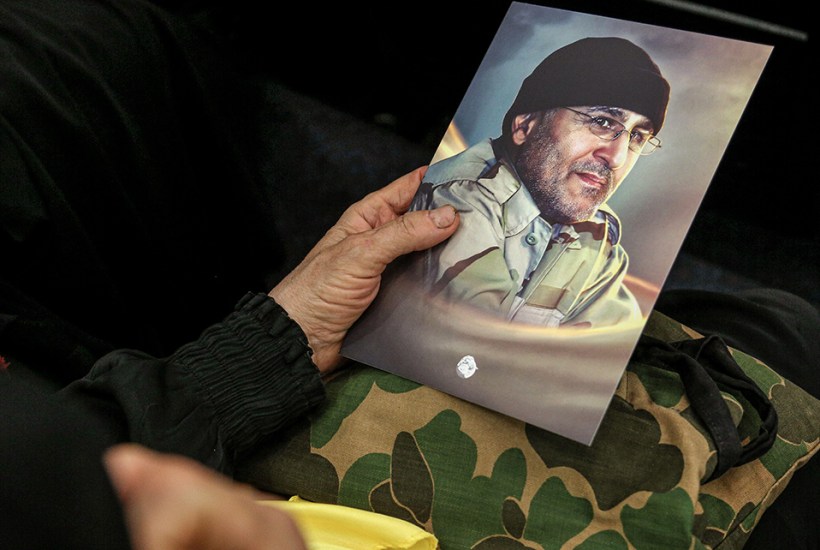The crucial moment in this vivid exposé of the murky world of transnational crime comes in 2015. Mustafa Badreddine, one of two Lebanese Shia cousins who for three decades had led the deadliest Iranian-linked terrorist network in the Middle East, was finally indicted by a UN special tribunal investigating the assassination of the Lebanese prime minister Rafic Hariri a decade earlier.
After an extraordinary career of mayhem, Badreddine had spent the previous three years leading an elite Hezbollah militia shoring up President Bashar al-Assad’s regime. But the tide had turned, and in July 2015 Qasem Soleimani, the commander of the Iranian Quds force in Syria, secretly flew to Moscow to beg for Russian military support. Otherwise, he argued, Assad would fall, mortally damaging the Shia axis between Syria, Iran and Hezbollah that kept the regional balance of power.
At almost exactly the same time Salvatore Pititto, a second-division hoodlum from Mileto in Calabria, southern Italy, was sweating because a huge drugs deal he had set up with a leading cocaine-producing cartel in Colombia was reaching its climax. An advance consignment of cocaine was making its way to Livorno among banana crates on the Liberian-registered container ship TG Nike. Pittito had invested a lot in the operation, which he hoped would catapult him and his family into one of the premier clans in the ’Ndrangheta or local mafia.
Despite fractious negotiations and meticulous organisation, the shipment was apprehended. A Lebanese intermediary called Castro absconded with the advance money to Beirut and Pititto was unable to resuscitate his game-changing deal. Beirut was significant, because of its central position in this book’s underlying theme – the trafficking which allowed the profits from South American drugs to be channelled, with Italian mafia assistance, to the Middle East and on to cash-hungry regimes which then paid extremist groups such as Hezbollah to buy weapons and do their murderous work.
Bolstered by court reports and first-hand sources, Miles Johnson explores his subject from three main angles. Pititto’s seedy world is observed through the gangster’s weirdly acquiescent mistress, Oksana Verman, a young Ukrainian turned police witness. He operates his aspirant mafia clan with his cousin Pasquale and other family members. After his Colombian operation goes wrong, his traumatised younger son, Alex, goes on the rampage and kills his best friend.
The book’s quiet hero, Jack Kelly, pursues the likes of Pititto through his position in the US Drug Enforcement Administration’s Special Operations Command (Socom) which is tasked with reeling in the big international traffickers. Kelly’s contacts in Colombia lead him to a middleman shipping cocaine to Jordan and into Syria where he was an associate of Imad Mughniyeh, one of the super facilitators channelling funds to Hezbollah and masterminding terrorist atrocities (the book’s third strand).
Mughniyeh is the beloved cousin of Badreddine, the instigator of Hariri’s assassination. Together they graduated through the ranks of the PLO’s Fatah in Lebanon. When that group was expelled from the country in 1982, its dominant position in Middle East terrorism was taken by Hezbollah which was fostering links with the Iranian Revolutionary Guard, a new regional force to be reckoned with following Ayatollah Khomeini’s accession to power.
Johnson records how, with Iranian backing, the cousins were behind many subsequent atrocities in the Arab world, including hijackings, bombings and the murder of William Buckley, the CIA station chief in Beirut. Adopting the name Elias Saab, Badreddine moved to Kuwait where he was arrested and sentenced to death. Mughniyeh then turned deadly terrorist in an effort to secure his cousin’s release. But that only happened fortuitously after Saddam Hussein invaded in 1990 and opened the prison gates. After a suitable hiatus Badreddine returned to Beirut where, adopting the new alias of Sami Issa and posing as a rich, womanising jeweller, he coordinated Hariri’s assassination.
Other sophisticated conspiracies back the thesis of narco-terrorist complicity. Kelly identifies the Lebanese middleman with links to Hezbollah and Badreddine as Mohamad Noureddine. But when he travels to Paris to arrest Noureddine, the operation is stymied by the state visit of the Iranian president Hassan Rouhani, who France does not want to offend at a time of delicate negotiations on nuclear proliferation. Similarly, a sting in Prague which leads to the detention of the Lebanese fixer Ali Fayad unravels when the Czech government gets cold feet and releases their prisoner.
Johnson sometimes skates over aspects of his story. The background of Castro, the intermediary in the Pittito drug scam, is ignored. Israeli involvement in Mughniyeh’s assassination is implied, but not the CIA’s. And why is there so little on the banking system which allowed the money laundering? But, with its abundance of burner phones and hoods with names like Babyface, the overall narrative is so compelling and well-presented that such lapses pale to insignificance.
Got something to add? Join the discussion and comment below.
Get 10 issues for just $10
Subscribe to The Spectator Australia today for the next 10 magazine issues, plus full online access, for just $10.
You might disagree with half of it, but you’ll enjoy reading all of it. Try your first month for free, then just $2 a week for the remainder of your first year.








Comments
Don't miss out
Join the conversation with other Spectator Australia readers. Subscribe to leave a comment.
SUBSCRIBEAlready a subscriber? Log in